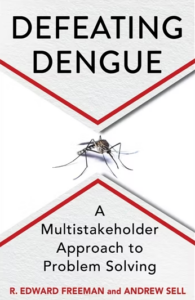Mosquitos Carrying Dangerous Viruses Are Spreading in the U.S. A New Book From UVA Darden Outlines One Solution
By McGregor McCance
“Defeating Dengue” Illustrates Promise of Stakeholder Capitalism, Venture Philanthropy in Addressing Health Threats
A growing threat to the health of Americans gained momentum this summer as the mosquito-borne viruses began appearing with alarming frequency in the United States.
The Centers for Disease Control in June issued a health advisory for increased risk of dengue infections in the US. In August, a New Hampshire man died after contracting Eastern equine encephalitis from a mosquito bite, and cases of the West Nile virus – including the hospitalization of infectious diseases expert Anthony Fauci – are increasing in parts of the country.
This year already has seen the highest incidence of the mosquito-borne dengue virus globally, according to the CDC, putting hundreds of millions at risk of an infection whose symptoms can include high fever, body aches, vomiting, rash and bleeding gums and nose. In severe cases dengue can be fatal.
What can be done to slow the spread of the world’s most common mosquito-borne illness, already endemic in more than 100 countries across Asia, Africa and the Americas?

Defeating Dengue:
A Multistakeholder Approach to Problem Solving. By R. Edward Freeman and Andrew Sell. Columbia University Press.
A new book, “Defeating Dengue: A Multistakeholder Approach to Problem Solving,” published by Columbia University Press, has an answer that holds the potential to mitigate the spread of the virus globally in the years to come.
Co-authored by University of Virginia Darden School of Business Professor R. Edward Freeman and Andrew Sell, a former senior researcher in Darden’s Institute for Business in Society, “Defeating Dengue” tells the remarkable story of how an unlikely group of stakeholders combined expertise, innovation and determination to reduce the incidences of dengue infections in an Indonesian community by 77%.
“Dengue virus threatens the health of Americans and people worldwide,” Freeman said. “But it can be stopped. This is a story of how one community proved it by building a trusting partnership of stakeholders that enabled an imaginative solution to a problem that has vexed them for generations.”
At the heart of the solution is a novel approach so counterintuitive that it seemed impossible – infecting mosquitos with a bacteria called “Wolbachia” that renders dengue and other viruses ineffective, then releasing those insects into communities to reproduce relatively harmless mosquitos.
Wolbachia’s superpower was already scientifically established, but figuring out how to test it on a small scale to fight dengue, deploy it in larger settings, and potentially expand it to major population centers was far more than a lab experiment.
Traditional approaches to slowing dengue have focused on reducing the mosquito population by spraying to kill adults or preventing their eggs from hatching, and by removing standing water where mosquitos lay eggs. So even the idea of suggesting more mosquitos could slow the spread of dengue produced understandable skepticism, opposition and anger in the Indonesian communities where the pilot project was proposed.
Addressing and overcoming that logical opposition and building a coalition that could plan and execute a strategy that included logistics, communication and education, phased-implementation, funding, learning from setbacks and more are what makes Freeman and Sells’s book as much a business book as a public health story.
Knowing Wolbachia worked was just the beginning.
“The dengue effort in Indonesia perfectly represents the value of the stakeholder approach to solving problems,” Freeman said. “It also illustrates the power of venture philanthropy and the potential for businesses to play critical roles in improving their communities.”
The stakeholder approach – a signature philosophy that permeates a Darden education and was articulated in a business context by Freeman four decades ago – holds that businesses work best when they value more than just shareholders. Rather, they consider the business’s effect on all stakeholders: employees, suppliers, customers, local residents, institutions and others. Such an approach also can be applied to solving community and social problems, the new book illustrates.
One of the book’s protagonists has long-established ties to the Darden School of Business.
George Tahija, who earned his Darden MBA in 1986, is commissioner of PT Austindo Nusantara Jaya, a holding company based in Jakarta, Indonesia, and co-founder of the Tahija Foundation. The foundation was a primary investor in the World Mosquito Project established to test the effectiveness of Wolbachia in small, controlled settings, and then expand to larger applications in the community of Yogyakarta, Indonesia.
Tahija and the foundation also provided organizational support, management expertise and other assistance to a project whose stakeholders included community residents, university researchers, public health officials, businesses, and regional governments. Tahija is confident that the experience could serve as a blueprint for other family businesses and foundations to play a leadership role in addressing difficult societal issues, especially in the developing world.
That degree of involvement in a humanitarian project by a key financial supporter serves as a model for “venture philanthropy,” which the authors of “Defeating Dengue” describe as an emerging way for philanthropists to accelerate the effectiveness of efforts to improve the human condition beyond providing funding.
“This effort would have been impossible without the expertise, financial support and continuing involvement of the Tahija family and the Tahija Foundation,” Freeman said. “Without their vision and purpose, it would not have happened.”
The entire project took more than a decade. In one key phase, Wolbachia-infected mosquitos were released between August 2016 and March 2017 in a designated area of Yogyakarta that covered five-square kilometers and was home to 65,000 people. Another area was designated a control area in which no mosquitos were released. It was home to 34,000 people.
A subsequent phase, conducted between January 2018 and March 2020, sought to measure the rate of dengue after releasing Wolbachia-infected mosquitos across a 26-square-kilometer urban environment that was home to more than 300,000 people. After promising early results, an unexpected new virus – COVID-19 – disrupted activity across the world and threatened to sidetrack the project.
However, project stakeholders were able to conclude the World Mosquito Project dengue testing in 2022, and one of the project partners, the University of Gadjah Mada, reported that the work reduced dengue fever cases by 77% and hospitalizations by 86% in the tested areas. Results were published in the New England Journal of Medicine.
The results left participants in the World Mosquito Project ecstatic.
“The success of the project thrilled all of us in so many ways,” Tahija said. “Making our community safer, building collaboration and self-esteem, sustaining a partnership across multiple years. All of these positive outcomes were so gratifying to everyone who played a part.”
Freeman and Sell write in “Defeating Dengue” that the Wolbachia-based project holds enormous potential for application in other parts of the world at a time when the threat of mosquitos carrying dengue continues to rise.
The World Mosquito Project’s experience provides a proven multistakeholder approach to helping solve the problem – an approach that has broad application for social challenges, businesses, and the communities in which they operate.
“The Wolbachia technology has the potential to be a global game changer as a complementary tool in the dengue prevention toolkit,” the authors write. “The future of the fight against dengue is not certain, but one thing is certain: dengue fever is a society-level problem that requires a society-level solution. Many stakeholder groups collaborating across sectors are needed, and local community participation across diverse geographic settings is essential – not only for the Wolbachia technology, but for any complementary set of dengue prevention techniques that can be brought to bear.”
The University of Virginia Darden School of Business prepares responsible global leaders through unparalleled transformational learning experiences. Darden’s graduate degree programs (MBA, MSBA and Ph.D.) and Executive Education & Lifelong Learning programs offered by the Darden School Foundation set the stage for a lifetime of career advancement and impact. Darden’s top-ranked faculty, renowned for teaching excellence, inspires and shapes modern business leadership worldwide through research, thought leadership and business publishing. Darden has Grounds in Charlottesville, Virginia, and the Washington, D.C., area and a global community that includes 18,000 alumni in 90 countries. Darden was established in 1955 at the University of Virginia, a top public university founded by Thomas Jefferson in 1819 in Charlottesville, Virginia.
Press Contact
Molly Mitchell
Senior Associate Director, Editorial and Media Relations
Darden School of Business
University of Virginia
MitchellM@darden.virginia.edu





